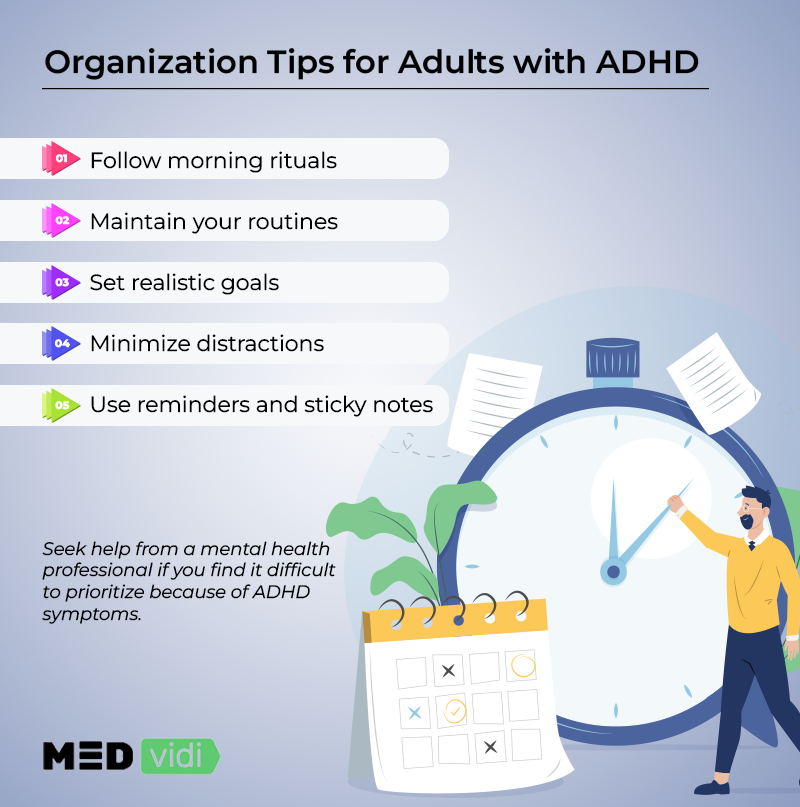Getting things done quickly, finishing tasks on time, meeting deadlines, and accurately calculating how long something would take—are the characteristics of efficient time management, according to the majority of us. Unfortunately, all this is not possible for everyone. Especially for someone with ADHD.
The hallmark symptoms of ADHD are forgetfulness and disorganization. But that doesn’t imply people with ADHD can’t learn how to be organized. With proper routines and tips, you can start developing strong organizing habits and practice setting priorities for your activities.
This article will discuss ADHD organization tools to help you get and stay more focused. Take a deeper dive!
With just one click, you can receive online advice for your ADHD symptoms from our professionals.
Why Is Organizing So Hard With ADHD?
ADHD and poor organizational abilities go hand in hand. It is because your ability to execute or carry out your intentions is aided by executive functioning. And the part of the brain that controls executive functioning is severely affected in ADHD. Executive processes can be inefficient and drain mental resources considerably more quickly for those with ADHD than for those without.
People with ADHD who struggle with organization and setting priorities are typically neither careless nor lazy. Executive functioning is a challenge for them. For those with ADHD, constant disorganization can be embarrassing and irritating to others. However, understanding what’s triggering this behavior can help you address the problem with empathy, whether you or the other person has ADHD.
ADHD Organization Hacks for Adults
Adults have a more busy life and responsibilities to create a work-life balance than children. So, it might be a huge challenge for an ADHD adult to keep everything on track. Below, you’ll find a collection of organization tools for ADHD to help you prioritize your tasks, balance your life and make it easier. So, how to prioritize better if you have ADHD?
Talk With Your Loved One
If you want to help your loved one with their ADHD and prioritizing, the first step is to explain the advantages of being organized in life. The majority of us find organization to be a tedious task that eventually gets uninteresting. It requires effort and time. So, encourage the person with ADHD to discuss the issues that can be solved by organizing tasks and try your best to emphasize the benefits of the routine organization.
Start With Targeting a Messy Bedroom
Helping a person with ADHD may start with a simple system of room management. There must be a place for everything in your room if you want to keep it organized. The bedroom of an adult with ADHD should be divided into logical areas for sleeping, working, reading, etc. This habit will aid you in maintaining order not only at home but also at work or other locations.
Set a Routine
Following a routine promotes consistent behavior. Routines are essential for someone who has ADHD or ADD. They help you focus on one task at a time, which makes managing daily duties easier. However, not every action has to be made a habit. Focus on activities that are necessary for completing vital tasks and managing everyday life. Scheduling regular times for eating, sleeping, work, and family time creates a framework for achieving goals and results.
Do you believe you may have signs of ADHD? Contact us, and a licensed physician will provide an online diagnosis or rule out a problem.
Follow Morning Rituals
Mornings are an important part of the daily routine. You will be more active and get off to a good start to the day if you wake up regularly and have a morning ritual that includes bathing, brushing your teeth, and clothing, but also some specific activity you choose. It could be doing yoga, brewing a cup of coffee, etc. Your morning routine should include eating a healthy breakfast since a healthy body will have a healthy mind.

Set Realistic Goals
Setting goals means trying to accomplish anything you want. SMART concepts should be used to create successful goals: specific, measurable, achievable, realistic, and timely. SMART goals have boundaries and are precisely defined. Ideally, your daily duties should be planned around SMART objectives. Consider what you want to achieve every day. Next, determine the sequence and procedure for achieving each of your goals. You can jot down your objectives, ideas, and strategies, then simply clip them on your desk at work or another prominent location so you can see them and follow through.
Use Tips to Prioritize Work
Completing multiple tasks at once can be challenging for persons with ADHD because they frequently lack impulse control and move from one subject to another. Decide on your priorities. You will be able to concentrate better on what is most important at the time. Priorities should be set in order of importance, starting with the most important task you need to do. Also, break down complicated tasks or projects into smaller, more manageable pieces. Finally, keep to your schedule and, if necessary, discipline it with a timer to prevent becoming diverted.
Seek an ADHD treatment plan that is customized to you by a physician with board certification.
Minimize Distractions
Where you work and your environment can greatly impact how well you perform when you have attention problems. Inform those around you when you need to focus. Take your job to a quiet room or conference room at your workplace if you have trouble focusing on it. Try to get a seat near the speaker at a lecture hall or conference and away from those who talk during the presentation. Face your desk toward a wall and keep your workspace clear of clutter to reduce distractions during work. Turn off email and social media at specific hours of the day, or even log off the Internet entirely on the devices you are not using to work if noise bothers you.
Make Use of Helpful Apps
Our lives have become simpler thanks to electronic devices. You may handle your work in a very practical way with the aid of your phone. You can organize your appointments and set daily reminders for various things using calendars and planners. Mobile software is more practical than writing a to-do list in your diary because you can set reminders for each task to ensure that you never forget anything, from a forthcoming deadline to a meet-up with friends and family.
Use Sticky Notes
Sticky notes can be another ADHD tool and physical reminder for quick tasks, in addition to using a calendar to keep track of significant dates and events. This can include reminders to pay bills, complete assignments, or clean. Like the calendar, the physical reminder can help you remember key activities. This is especially true if you adhere to the sticky notes on a board, calendar, or desk.
See an ADHD Coach
An ADHD life coach is a professional trained to help people with ADHD better manage their life. Visiting a coach or a psychotherapist is the best choice for you if your issues are getting out of control and your disorganization is becoming chronic. For instance, you can get assistance if you want to change employment, stop being chronically late and disorganized, or eliminate the habits that harm your marriage. In addition to helping you develop planning and management skills, healthier self-esteem and relationships, self-motivation, and a greater sense of self-efficacy, a good coach can help you achieve your goals.
ENDnote
The process of change won’t happen overnight, however. These ADHD organization tools require patience, practice, and a positive attitude. Using these techniques, you can become more productive, organized, and in control of your life and improve your self-esteem.
Avoid ignoring your ADHD since it can make your life disturb. For an accurate diagnosis and help, consult a health expert.













